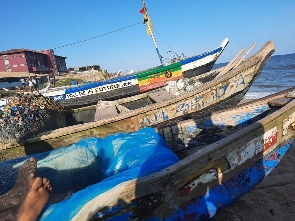 The Ministry of Fisheries and Aquaculture Development has registered over 14,000 canoes in Ghana
The Ministry of Fisheries and Aquaculture Development has registered over 14,000 canoes in Ghana
An Environment and Natural Resources Lecturer at the University of Ghana has said the registration of canoes in the country will fail to streamline fishing activities in Ghana’s territorial waters if the illegal activities of foreign trawlers are not stopped.
Professor Wisdom Akpalu says the foreign trawlers would continue to illegally fish small pelagic fishes and this will result in the same depletion of the country’s fish stock, a situation the registration is intended to prevent.
The Ministry of Fisheries and Aquaculture Development has registered over 14,000 canoes so far, in a biometric canoe registration project aimed at regulating artisanal fishermen and address the open-access regime.
The open-access regime in the country’s fisheries sector allows every artisanal fisherman to start fishing at any point in time without any regulation, causing overfishing and low profit.
This problem, according to Prof Akpalu, who is also the Director of the Environment and Natural Resource Research Initiative (ENRII) at the University of Ghana, needs to be tackled well by addressing all the contributing factors and not just one side.
He was speaking in an interview with 3news.com on the sidelines of a training organised by ENRI-Environment for Development for Journalists in Accra last week, to build their capacity in environmental reporting.
The country’s fisheries sector has been faced with declining fish stock, over the years, leading to low profits, with available data indicating that the 35.4tonnnes of fish caught in 1992 reduced to 15.5tonnes in 2016.
It is also on record that only 40 per cent of the fish consumed in Ghana today is produced locally.
Excess fishing is worsened by illegal, unreported activities and destructive techniques.
These challenges have caused the loss of livelihoods for the about 2.7 million people.
These foreign trawlers contribute heavily to the overfishing problem, both because of the large number of vessels and due to saiko, the practice of illegally targeting small juvenile stocks that could become bigger and more valuable.
They freeze the fishes into pellets, and ship them to middlemen for processing, resulting in a poor-quality product.
Touching on efforts to revamp the industry, Prof Akpalu recommended some form of restriction on the open-access right by allowing 9,000 canoes as opposed to the current 14,000 canoes in the Atlantic Ocean.
He called for a common pool resource which allowed the fishermen to come together as a team to champion their concerns and possible solutions.
The Dean of the School of Research and Graduate Studies also urged politicians not to interfere with the activities of these fishermen, but rather give them the independence and liberty to operate.
Journalists were also urged to inculcate the Sustainable Development Goals (SDGs) in their environmental reportage to ensure the country’s target is achieved.